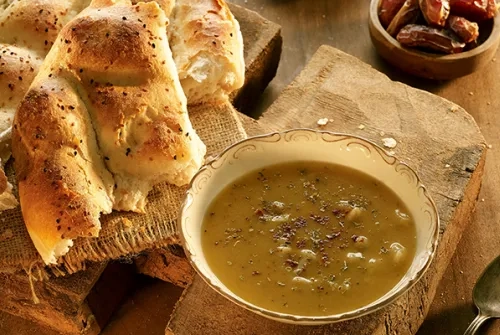Ramadan Warning for Those Who Experience Stomach Disorders
Gastric disorders such as gastritis and ulcers increase even more in the month of Ramadan. Warning patients to take their medication 5-10 minutes before eating, Yeditepe University Kozyatağı Hospital Gastroenterology Specialist Prof. Dr. Meltem Ergün stated: "After eating iftar and sahur, it should not sleep immediately." Prof. Dr. Ergün also advised on the foods that should be preferred in sahur and iftar.
With the month of Ramadan, eating habits began to change. The food eaten after a long hunger, or the foods consumed in the sahur can adversely affect people who have stomach ailments such as gastritis and ulcers. Stating that stomach disorders such as gastritis and ulcers increased even more in Ramadan, Yeditepe University Kozyatağı Hospital Gastroenterology Specialist Prof. Dr. Meltem Ergün gave important advice to the patients.
Since the days of Ramadan are also long, the duration of fasting is prolonged. Prof. Dr. Meltem Ergün: “Therefore, the need for water and liquid is more. It will be beneficial to open the fast with water, continue with a liquid food such as soup, and then wait for a while before switching to the main meal. If the patient reaches the lying position directly after eating iftar or sahur, severe reflux may occur. Therefore, the patient should not be hospitalized immediately after eating iftar and sahur. Going to bed after an hour or two is beneficial in terms of not increasing reflux discomfort.”
“The Second Half of Ramadan is Full of Complaints''
Stating that the discomfort of patients with gastritis and ulcers can become more prominent during the Ramadan period, Prof. Dr. Meltem Ergün: “Especially in the second half of Ramadan, we detect an increase in ulcer perforation and ulcer hemorrhages in the ulcers of those with such disorders, especially those with ulcers, in our patients. We especially recommend that patients with known active ulcers do not fast. People who have ulcers and are recovering can of course fast. But at least during the Ramadan period, use acid suppressant treatment twice a day, iftar and sahur, before eating. It may be a little difficult to drink and wait for iftar time, but if you drink the medicine as much as possible and then eat after 5-10 minutes, it will be effective in increasing the effect of the medicine.”
“Do Not Prefer Fried Foods”
Pointing out that the use of stomach drugs by our patients with ulcers and gastritis 5-10 minutes before eating will prevent the increase in stomach disorders, Yeditepe University Hospital Gastroenterology Specialist Prof. Dr. Meltem Ergün warned: “It is especially useful to open the iftar with liquid foods such as water and soup. In addition, we especially recommend that you start the main meal after 15-20 minutes after breaking the fast. Heavy meals should be avoided, vegetable meals as much as possible, or veggie-fleshed meals. But these should also be in the form of cookware. Or baked foods should be preferred. Fries should not be preferred. We recommend avoiding spicy foods. Fast food is not the food of choice during Ramadan. Try to consume as little carbohydrates as possible. Take care to stay away from foods such as pastry and baklava. Things that should not be consumed during Ramadan, especially cigarettes, tea, and coffee, can trigger reflux and stomach ailments. Instead, we can use herbal teas like water and linden mint-lemon.”
Press Coverage: aa.com | posta.com | sabah.com | fanatik.com | imeturk.com | yeniakit.com | mynet.com
About
Faculty and Year of Graduation:
İstanbul University School of Medicine, 1995
”
See Also
- What is Colon (Intestinal) Cancer? Symptoms and Treatment
- What Causes Nausea? What is Good for Nausea?
- What is Heartburn? What is Good for Heartburn?
- What is Fatty Liver?
- What is Good for Diarrhea? How to Treat Diarrhea?
- What is a Probiotic? What Are Its Benefits?
- What Is Reflux?
- What are the Nutrients That Stress Digestion?
- What are Capsule Treatment Methods in Stomach, Small, and Large Intestine Screening?
- Gastroenterology Procedures
- Pay Attention When Consuming These Nutrients!
- Mediterranean Diet Prevents Developing Colon Cancer!
- Breakthrough Innovations in Colon Cancer
- Diarrhea and Constipation Increased in Those with Irritable Stomach
- Anemia, Constipation, and Vomiting of Unknown Cause Can Be Dangerous
- Causes and Treatment of Abdominal Bloating
- Hepatitis Disease Poses Risk for Esophageal Varices
- The Giant Stones In The Biliary Tract Of 71-Year-Old Patient Were Removed Without Surgery
- How Is Stomach Infection Transmitted?
- What is Gastroesophageal Reflux Disease?
- Capsule Endoscopy
- Stretta / Endoscopic Reflux Treatment
- Fundoplication Method / Endoscopic Reflux Treatment
- Throat Reflux
- Techniques and Applications Used in Gastroenterology
- Irritable Bowel Syndrome (IBS)
- How to Swallow the Drug?
Alo Yeditepe





